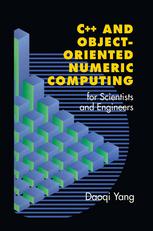

Most ebook files are in PDF format, so you can easily read them using various software such as Foxit Reader or directly on the Google Chrome browser.
Some ebook files are released by publishers in other formats such as .awz, .mobi, .epub, .fb2, etc. You may need to install specific software to read these formats on mobile/PC, such as Calibre.
Please read the tutorial at this link: https://ebookbell.com/faq
We offer FREE conversion to the popular formats you request; however, this may take some time. Therefore, right after payment, please email us, and we will try to provide the service as quickly as possible.
For some exceptional file formats or broken links (if any), please refrain from opening any disputes. Instead, email us first, and we will try to assist within a maximum of 6 hours.
EbookBell Team

4.3
28 reviewsThis book is intended to be an easy, concise, but rather complete, introduc the ISO/ANSI C++ programming language with special empha tion to sis on object-oriented numeric computation for students and professionals in science and engineering. The description of the language is platform independent. Thus it applies to different operating systems such as UNIX, Linux, MacOS, Windows, and DOS, as long as a standard C++ compiler is equipped. The prerequisite of this book is elementary knowledge of cal culus and linear algebra. However, this prerequisite is hardly necessary if this book is going to be used as a textbook for teaching C++ and all the sections on numeric methods are skipped. Programming experience in an other language such as FORTRAN, C, Ada, Pascal, Maple, or Matlab will certainly help, but is not presumed. All C++ features are introduced in an easy way through concepts such as functions, complex numbers, vectors, matrices, and integrals, which are familiar to every student and professional in science and engineering. In the final chapter, advanced features that are not found in FORTRAN, C, Ada, or Matlab, are illustrated in the context of iterative algorithms for linear systems such as the preconditioned conjugate gradient (CG) method and generalized minimum residual (GMRES) method. Knowledge of CG, GMRES, and preconditioning techniques is not presumed and they are ex plained in detail at the algorithmic level.